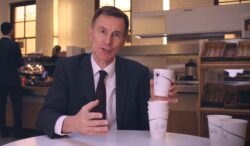Jeremy Hunt showing how economic problems have stacked up (Picture: HM Treasury)
Jeremy Hunt has been likened to feckless comedy character Mr Bean after making a video to explain inflation using coffee cups in the Treasury canteen.
As data showed prices rose 10.5 per cent, the chancellor posted the film, in which he orders a flat white and sits with cups marked Covid, Ukraine and Energy, explaining: ‘The pound in your pocket is worth less than it used to be.
‘People who transport the coffee beans over the oceans have to pay more for their fuel.
‘People who have to transport the coffee beans inside the UK have to pay more and the result is they have to put up the price of a cup of coffee, or else they lose money.’
The chancellor – appointed by former prime minister Liz Truss in October after her disastrous tax-cutting mini-budget – then promises ‘to cut inflation in half this year’.
Critics swiftly suggested the government’s top bean counter had forgotten to bring cups marked Truss, Johnson and Brexit.
‘Patronising and really, really lame,’ Sarah Copeland tweeted. ‘This is awful, like a failing teacher’s attempt with visual aids.’
Alex Duce posted: ‘This is like something off Playschool.’ Andy Taylor wrote: ‘Hello, can I have a flatlining economy please?’
Opponents accused Mr Hunt of ignoring the government’s role in soaring prices – and taking credit for falls predicted anyway.
Lib Dem Sarah Olney called it ‘a Mr Bean-esque video from the clueless party that crashed the economy and sent mortgage bills spiralling’.
Hunt grabbing some coffee cups in the ‘Mr Bean-esque’ video (Picture: HM Treasury)
Classic comedy character Mr Bean (Picture: Lisa Maree Williams/Getty)
A Labour source told the BBC: ‘The “Not me guv” explainer misses out the fundamental fact that the British public have been so exposed to economic shocks and the energy crisis because of 13 years of Tory failure.’
But the video got 500 likes and was retweeted by Conservative backbenchers including Robert Largan. ‘A good, quick explanation video,’ he insisted.
Annual inflation – which peaked at 11.1 per cent in October – fell again from November’s 10.7 per cent, due to falling fuel prices and slower rises in the cost of clothes and shoes. But food soared again by 16.8 per cent, with bread up 20.5 per cent, and milk 38.5 per cent in a year – the biggest rises since 1977.
Predictions of seven per cent interest rates have not come true. But economists expect the Bank of England to raise the base rate again to four per cent next month.
Get in touch with our news team by emailing us at [email protected].
For more stories like this, check our news page.
‘Hello, can I have a flatlining economy please?’





